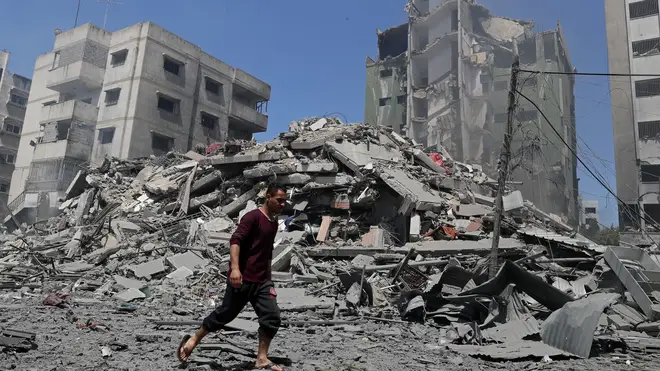
Paul Brand 7am - 10am
17 May 2021, 03:24

It is the worst fighting in the territory that is home to two million Palestinians since Israel and Hamas’s devastating 2014 war.
Israeli warplanes have unleashed a series of heavy airstrikes at several locations of Gaza City as the country’s prime minister suggested the war against Hamas would continue.
Explosions rocked the city from north to south for 10 minutes early on Monday in an attack that was heavier, on a wider area and lasted longer than a series of air raids 24 hours earlier in which 42 Palestinians were killed.
That was the deadliest single attack in the latest round of violence between Israel and the Hamas militant group that rules Gaza.
In a televised address, Israel’s prime minister Benjamin Netanyahu said Israel’s attacks were continuing at “full-force” and would “take time”.
Our fighter jets are currently striking terror targets in Gaza.
— Israel Defense Forces (@IDF) May 16, 2021
Israel “wants to levy a heavy price” on the Hamas militant group, he said, flanked by his defence minister and political rival, Benny Gantz, in a show of unity.
Hamas also pressed on, launching rockets from civilian areas in Gaza toward civilian areas in Israel.
One slammed into a synagogue in the southern city of Ashkelon hours before evening services for the Jewish holiday of Shavuot, Israeli emergency services said, with no injuries reported.
The hostilities have repeatedly escalated over the past week, marking the worst fighting in the territory that is home to two million Palestinians since Israel and Hamas’s devastating 2014 war.

“I have not seen this level of destruction through my 14 years of work,” said Samir al-Khatib, an emergency rescue official in Gaza.
“Not even in the 2014 war.”
Israel’s airstrikes have levelled a number of Gaza City’s tallest buildings, which Israel alleges contained Hamas military infrastructure.
Among them was the building housing The Associated Press Gaza office and those of other media outlets.
Sally Buzbee, the AP’s executive editor, called for an independent investigation into the airstrike that destroyed the AP office on Saturday.
Mr Netanyahu alleged that Hamas military intelligence was operating inside the building and said on Sunday any evidence would be shared through intelligence channels.
Neither the White House nor the State Department would say if any had been seen.
“It’s a perfectly legitimate target,” Mr Netanyahu told CBS’s Face the Nation.
Asked if he had provided any evidence of Hamas’s presence in the building in a call on Saturday with US President Joe Biden, Mr Netanyahu said: “We pass it through our intelligence people.”
Mrs Buzbee called for any such evidence to be laid out.
“We are in a conflict situation,” she said. “We do not take sides in that conflict. We heard Israelis say they have evidence; we don’t know what that evidence is.”
Meanwhile, media watchdog Reporters Without Borders asked the International Criminal Court on Sunday to investigate Israel’s bombing of the AP building and others housing media organisations as a possible war crime.

The latest outbreak of violence began in east Jerusalem last month, when Palestinians clashed with police in response to Israeli police tactics during Ramadan and the threatened eviction of dozens of Palestinian families by Jewish settlers.
A focus of the clashes was the Al-Aqsa Mosque, a frequent flashpoint located on a hilltop compound revered by both Muslims and Jews.
Hamas began firing rockets toward Jerusalem last Monday, triggering the Israeli assault on Gaza.
At least 188 Palestinians have been killed in hundreds of airstrikes in Gaza, including 55 children and 33 women, with 1,230 people wounded.
Eight people in Israel have been killed in some of the 3,100 rocket attacks launched from Gaza, including a five-year-old boy and a soldier.
Hamas and the Islamic Jihad militant group have acknowledged 20 fighters killed in the fighting.
Israel says the real number is far higher and has released the names and photos of two dozen alleged operatives it says were “eliminated”.
The assault has displaced some 34,000 Palestinians from their homes, UN Mideast envoy Tor Wennesland told an emergency meeting of the UN Security Council, where eight foreign ministers spoke about the conflict.